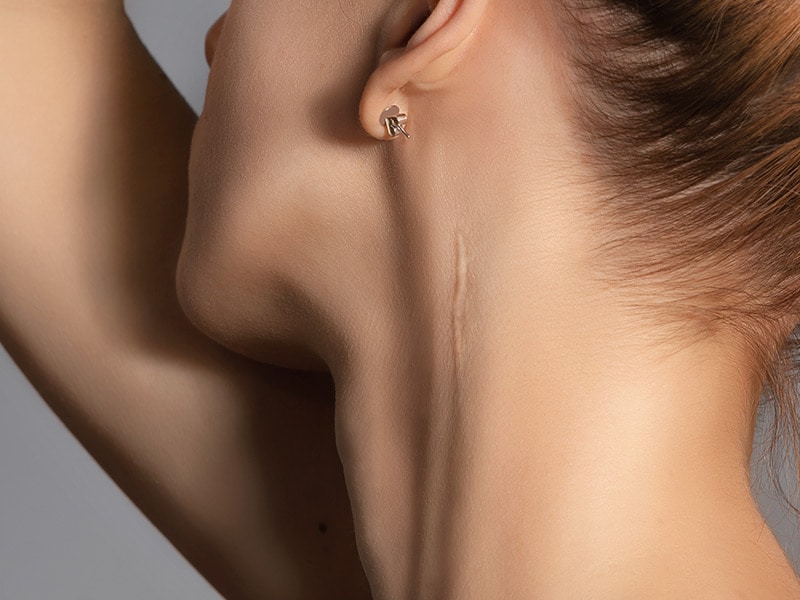Scar Revision
in New Jersey & Philadelphia
Home » Procedures » Scar Revision
Scarring on the face can be particularly distressing because the face is a very aesthetically sensitive area. Unwanted facial scars can result from accidents, injury, piercings, prior surgical procedures, and skin conditions such as acne. Scarring can cause noticeable discoloration, redness, uneven texture, skin depressions, and/or skin thickening. In severe cases, the scar can become raised to the point that it extends beyond the boundaries of the initial wound to form a keloid. All of these forms of scarring can be treated by an expert plastic surgeon.
Dr. Alisa Yamasaki, MD, is a Harvard-trained and double board-certified facial plastic surgeon and Otolaryngologist-Head and Neck Surgeon who specializes in facial scar revision. She has extensive expertise in surgical and non-surgical procedures, as well as reconstructive facial plastic surgery.
Experience the Excellence of Dr. Yamasaki, Harvard-Trained Facial Plastic Surgeon.

What Is Scar Revision Surgery?
Scar revision surgery is an outpatient procedure that is used to improve the appearance of a scar. It is most commonly performed under local anesthesia in the office, depending on the location and extent of scarring. While no scar can be removed completely, the goal of surgery is to camouflage the appearance of the scar and help it to blend with the existing skin around it. Certain types of scars are more difficult to repair than others. The success of revision surgery is dependent on the type of scar, location, severity of the original injury, overall skin quality, genetics, overall health, and other factors.
What Is a Scar?
After an injury to the skin, the body’s natural process of wound healing begins. During the healing process, the body lays down collagen and new blood vessels to help repair the injured skin and soft tissue. Over time, the collagen builds up and the healing tissue grows. The new tissue may continue to grow and mature over the course of one year or longer. A scar is the permanent mark that is left after the injury site heals. Scar consists of dense collagen and other skin components and often looks different than the native skin. It can appear raised and bumpy, widened and depressed, or discolored.
Although many scars improve over time to more closely match the surrounding skin, some scars look more prominent due to poor wound healing or severe injury. Some patients find the scars to be disfiguring or notice functional problems related to the scar such as skin tethering and restricted facial movement. Visible scars can impact self-confidence or affect a patient’s personal, social, or professional life, depending on the location of the scar and its impact on the face. For these reasons, patients may decide to pursue a scar revision procedure.
Types of Scars
Hypertrophic Scars
- Appearance: Raised, red or pink scars that remain within the boundaries of the original wound
- Formation: Overproduction of collagen during the healing process
- Common Causes: Surgical incisions, injuries, burns, and cuts
- Treatment Options: Corticosteroid injections, silicone sheets, laser therapy, scar revision surgery
Keloid Scars
- Appearance: Raised, thick, and irregularly shaped scars that extend beyond the original wound boundaries
- Formation: Excessive collagen production leading to an overgrowth of scar tissue
- Common Causes: Surgical incisions, injuries, piercings, tattoos, and acne
- Risk Factors: More common in people with darker skin tones and those with a genetic predisposition/family history of keloids
- Treatment Options: Corticosteroid injections, scar revision surgery, radiation therapy
Atrophic Scars
- Appearance: Depressed or indented scars that sit below the surface of the surrounding skin
- Formation: Loss of underlying fat or muscle tissue, often due to insufficient collagen production
- Common Causes: Acne, chickenpox, and injuries.
- Treatment Options: Dermal fillers, microneedling, laser resurfacing, chemical peels, scar revision surgery
Contracture Scars
- Appearance: Tightened, shiny skin that can restrict movement, often occurring after burns
- Formation: Skin tightening due to the loss of underlying tissue and the skin’s attempt to close a large wound
- Common Causes: Severe burns, extensive injuries
- Treatment Options: Scar revision surgery, skin grafting, physical therapy
Surgical Scars
- Appearance: Can be thin, flat, raised, depressed, or discolored – depends on the scar location, surgical technique, healing process, and individual skin type
- Formation: Result from incisions made during surgical procedures
- Common Causes: Anti-aging surgeries like facelifts or tummy tucks, medically necessary surgeries
- Treatment Options: Topical treatments, laser therapy, scar revision surgery
Consulting with a skilled plastic surgeon is essential to determine the best treatment option that is tailored to your specific scar type and individual needs.
Scar Revision Surgery Benefits
The benefits of a patient’s scar revision surgery will depend on the type of scar, its location, size, and other patient factors. Some scars, such as hypertrophic or keloid scars, have difficulty healing well and may never be completely erased. Particularly for aggressive scars, ongoing follow up treatments such as steroid injections and laser treatments may be necessary in order to optimize the healing process.
While some facial scars may heal well on their own, scar revision surgery can be beneficial for those who want to improve the appearance of scars caused by injury or previous surgery. Some advantages of scar revision include:
01
Reducing the size, thickness, or discoloration of the scar
02
Blending the texture and color of the scar more naturally into the surrounding skin
03
Repositioning the original scar along the natural lines of a patient's skin
04
Alleviating tightness and restoring more normal movement for scars that tether the skin
Scar Revision Consultation
If you are unhappy with the appearance of your facial scar, the first step is to schedule a surgical consultation. During the scar revision consultation, Dr. Yamasaki will discuss which types of treatments are available, depending on the specific characteristics of the scar. This may include scar revision surgery in addition to injectable options and/or skin-based treatments. Injectables can improve the appearance of the scar if it is sunken or depressed. If the scar protrudes,steroids and other types of injection may be the best initial option. For surface irregularities or discoloration, skin-based treatments such as laser treatments, dermabrasion, and chemical peels may be the best option. If a combination of treatments is necessary, Dr. Yamasaki will review this with you. It is important to follow all of the perioperative instructions when it comes to preparing for and recovering from scar revision surgery or treatment.

You won't regret
booking Dr. Yamasaki
“Dr. Yamasaki is incredible. She’s a physician that genuinely cares about her patients. From the moment she stepped in to the room, she was extremely diligent, comforting, and never made me feel rushed. She explained everything in great detail and went above and beyond in our appointment. It was refreshing to be seen by a physician that genuinely cares and is sympathetic to patient issues. If you’re thinking about seeing Dr. Yamasaki or interested in seeing her, don’t think twice. Book an appointment. You won’t regret it.”
Jonathan Harper
The Ideal Candidate for Scar Revision Surgery
Scar revision surgery may be an option for patients of all ages who are interested in improving the appearance or function of a scar. Ideal candidates are in good overall health, non-smokers, and do not have significant medical conditions that could impair wound healing or increase the risk of complications. Those with good skin quality and also have realistic expectations regarding surgery.
If surgery is not the best option in your case, there may be other procedural options such as a chemical peels, dermabrasion, laser therapy, and/or injectable treatments. Dr. Yamasaki will review all options with you to determine the treatment approach that best suits your need.
The Scar Revision Surgery
During the consultation, Dr. Yamasaki customizes each patient’s treatment plan according to the appearance of the scar, facial location, and associated functional issues. Most of the time, scar revision procedures can be easily performed in the office, though in some cases the procedure may be performed in the operating room under sedation or general anesthesia. The overall goals of the surgery are to remove unhealthy scar tissue and close the wound in a way to facilitate good wound healing and final scar camouflage. The specific surgical approach depends on the location, size, and appearance of the scar. Dr. Yamasaki will provide detailed instructions regarding preoperative preparation and postoperative care, depending on your particular scar revision procedure.
Before & After Scar Revision

Scar Revision Surgery Recovery
Following the procedure, Dr. Yamasaki will provide post-operative instructions to ensure proper healing and provide medication, if necessary, to manage any pain. Unlike other plastic surgery, most scar revision treatments in the office do not prevent patients from returning to work or significantly changing their routine.
Scar Revision Surgery Cost
Due to the individualized nature of each scar, variables that affect the cost of each treatment are different for each patient. The cost of scar revision surgery can be determined by:
- Type of scar
- Location of scar
- Treatment needed
- Complexity of treatment
Insurance providers typically do not cover the cost of scar revision. In some special situations, scar revision may be considered medically necessary and may be covered by your insurance, depending on the specific benefits included under your insurance plan. Dr. Yamasaki’s office will help to determine if your treatment may be covered by insurance. If insurance coverage is not provided, there are financing options such as CareCredit.
Why Choose Dr. Yamasaki for Your Scar Revision
- Renowned Expertise: Double Board-certified and fellowship-trained, Dr. Yamasaki is a top specialist in otolaryngology and facial plastic surgery.
- Prestigious Affiliations: Dr. Yamasaki’s association with Penn Medicine and her experience at top institutions like Harvard and the University of Michigan ensure multidisciplinary, superior care.
- Personalized Patient Care: Each scar revision treatment is tailored to your skin type, scar characteristics, and aesthetic goals for optimal results.
- Advanced Scar Minimization Techniques: From surgical revision to laser treatments, Dr. Yamasaki utilizes cutting-edge methods to reduce scar visibility.
- Proven Results: Patients trust Dr. Yamasaki for her meticulous approach, achieving smoother, more even skin with minimal downtime.

Dr. Alisa Yamasaki, MD, is a Harvard-trained and double board-certified Facial Plastic Surgeon and Otolaryngologist–Head & Neck Surgeon specializing in scar revision and facial reconstruction. She helps patients improve the appearance of scars, whether from injury, surgery, or skin conditions.
If you’re looking to smooth, fade, or refine a scar, schedule a consultation at Yamasaki Facial Plastic Surgery in New Jersey & Philadelphia.
Common Scar Revision Surgery Questions
Who is an ideal candidate for Scar Revision Surgery?
Scar revision surgery is available for patients of all ages and is ideal for anyone suffering from a scar with a bothersome appearance. Patients who are non-smokers, in good overall health, and with good skin quality typically have the best results after surgery. Even if surgery is not the best option for you, you may be a candidate for other types of scar treatments. Dr. Yamasaki will review all options with you during your consultation.
What are the potential risks associated with Scar Revision Surgery?
Potential risks of scar revision surgery include infection, bleeding (e.g. hematoma), swelling, pain,numbness or changes in skin sensation, skin discoloration, recurrent scar formation (particularly in cases of keloids), and healing problems at the incision line.
When will I see my Scar Revision Surgery results?
You will see the initial results of your surgery within 3 to 4 weeks. Temporary skin redness and swelling will continue to improve over the course of the first 5 to 6 months. However, your skin’s natural healing process can take up to 12 to 18 months to be complete, and it is expected that you will see ongoing improvement to the surgical site during this time.
How long will Scar Revision Surgery results last?
Once the surgery site matures at 12 to 18 months, the results will have stabilized. The scar revision surgery results do not “fade” over time. However, the skin of your surgery site will continue to age and undergo changes along with the native skin surrounding the surgery site.
Is Scar Revision Surgery right for me?
If you have a facial scar that has a suboptimal appearance and/or causes a hindrance to your facial function, then scar revision surgery may be a good option for you.
